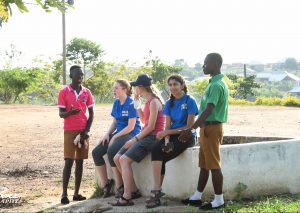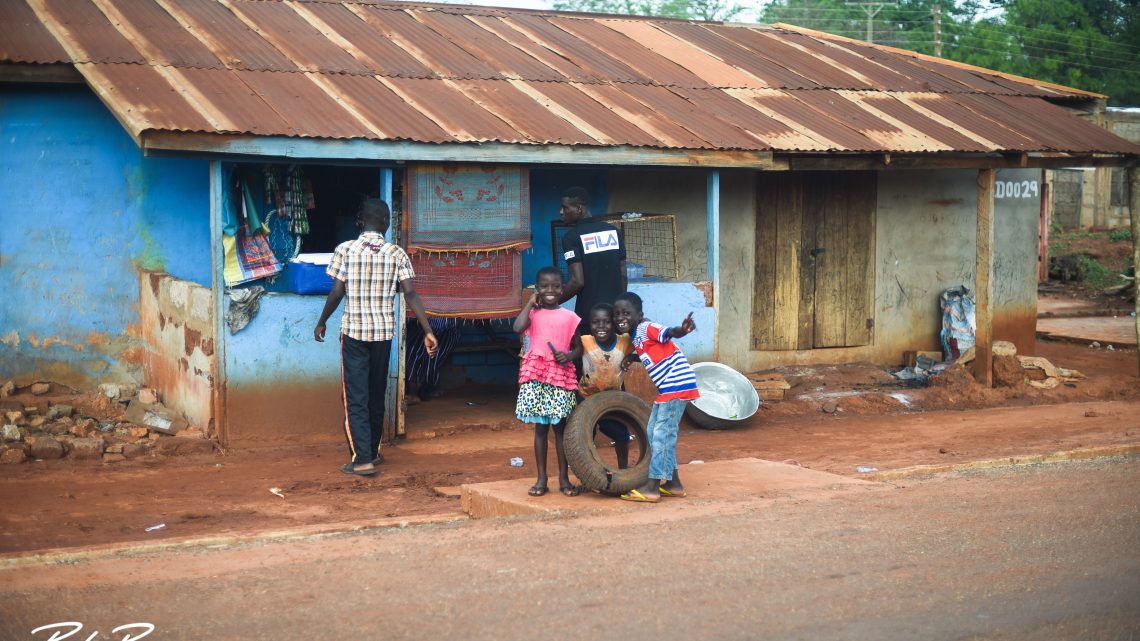I was sitting in the back of a van crowded with 11 people, and I had to pee. Not the kind where you feel the urge but can hold it—this was the kind that doesn’t care if you’ve got a toilet or an empty water bottle.
This was a terrifying and unavoidable reality; we were in the middle of Ghana, West Africa, where public bathrooms are a foreign concept. I voiced my plight to the priest in the front seat. He translated my urgent request in his native Akan dialect Twi to our driver. Five minutes later our van swerved into a gas station. I clambered out and asked a woman if they had a bathroom. She casually stood up, unamused by my bulging bladder, and asked me something in accented English that I couldn’t understand.
“What?”
She repeated her question. I still didn’t get it.
“Uh… I’m sorry, what?”
“DO. YOU. NEED. TO. URINATE.”
“Oh, yes, YES, I need to urinate!!!”
She pointed at a crude concrete structure in the corner of the parking lot. The walls were as tall as my shoulders and had faded pink paint peeling off. I walked around the corner. There were three open holes in the ground. There was no sink or soap for hand washing. I was about to break the first rule the American travel counselor instructed me to follow on my trip: Practice hand hygiene diligently; always wash hands before eating and after using the toilet. I didn’t care. I had to go.
In fact, I had spent a year trying to get to chance to do this. Not the peeing in a hole part. The being in Ghana part. One year ago, I told Fr. Mark, my priest at my university’s Catholic student center, I wanted to go to Ghana. As a native Ghanaian, he goes there every few years to visit family and bring back supplies. When I told him this, the prospect of actually going to Africa seemed more like a dream than a reality. Yet there I was, 365 days and half a globe later, peeing in a hole in the ground in Ghana. I didn’t have a clue what I was doing there.
Discovering Places and People to Share Christ’s Love With
I didn’t go to Africa for Divine Inspiration, or for a crazy adventure, or for educational purposes. I just kind of went, as one does. I had no agenda and no idea what to expect. Which made my discoveries about myself, my faith and how I relate to this world completely raw, authentic, and complicated.
I tend to be a rule-follower. When you go to African countries, the U.S. Department of State gives you a stack of papers outlining the dangers you should expect to encounter, as well as a list of “Basic Protective Measures.” When I thumbed through the thing, I started to sweat. There were a lot of rules to remember.
Fr. Mark laughed at this when I told him about it.
“When you go to the travel clinic, they act like Ghana is the most dangerous place, but no,” he said. “People in Ghana are so friendly. They want to get to know you. You know, the people here have nothing, but they’re happy.”
The people wanted to get to know me, all right. The friendliness of the Ghanaians is what caused me to break another rule my first day in the country: Wear appropriate footwear when walking, wading or swimming to avoid injury and exposure to parasites and poisonous plants and animals.
We were visiting a waterfall inside a state park. There were about twenty local Ghanaians at the bottom of the falls swimming and sliding down the rocks. Three young men sat behind the falls where the rock created a small ledge of dry space. They pointed at me and motioned to come to them, and so I kicked off my sandals and splashed through the water to the base of the waterfall. I clambered up the sloping rock, which was quite difficult to do with the water bashing down on my head, and one of the men grabbed my hand and pulled me up to sit with them.
The men at the waterfall expressed a sentiment that recurred with many Ghanaians I talked to. They wanted to come to America, because life in Ghana was difficult. This was Discovery No. 1 about myself, my faith and how I relate to this world: Entire nations are struggling and desire help from those who can afford it. And I, poor college student that I am, should not be excused to turn a blind eye to this truth. God calls me to love my neighbors, period. He doesn’t command me to love my neighbors once I have a job and more money and resources, but right now. And let me tell you, this Discovery No. 1 really sucked, because I knew my life would have to change when I returned to America.
Margaret Cavana, a parishioner that travelled to Ghana in 2016, shared with me that she had the same realization.
“We have a duty to do things to lessen the divide between the rich and the poor,” Cavana said. “Yeah, people are happy, but that doesn’t mean they’re OK. They have huge burdens we can’t even fathom.”
I was thinking about this idea during my second day in Ghana when our group travelled to a monkey sanctuary near a village. The village was comprised of many homes along dirt roads. Most were small square buildings made of either wood or sheet metal, sometimes concrete, and they all had red-rusted tin roofs. The windows were often just open holes in the building’s walls, and doors were just sheets or curtains fixed to the top of the frame.
I didn’t know how many visitors that monkey sanctuary gets in a year, but I figured it was pretty low. Our group bought an unreasonable amount of bananas and packaged nuts from the locals. I paid an absurd price, but I was gung-ho about my civic duty to lessen the divide, so I was genuinely hoping to get swindled by these people.
A stooped old man greeted us and led us into the jungle along a dirt path. We all stood in a circle and I was trying to understand what he was saying when I glanced to my left and saw an army of monkeys jogging towards us. Fr. Mark poured some peanuts into his hand and stuck it out. A monkey came up and grabbed the nuts with its little paw. They didn’t look rabies-infested to me. So I broke another of the highly stressed travel-counselor rules: Never assume that an animal or bat is free of rabies; do not handle or feed pets, unknown animals (especially dogs and monkeys), or bats.
Figuring Out How to Put Spiritual Love Into Action
When I retuned to America, people loved videos of the monkeys. And people really hated when I told them that there are big problems in Ghana. And then people got really uncomfortable when I told them that, yeah, we’re actually obligated to do something about it. When you cut the baloney, we have resources to spare.
“It’s realistic for most Americans to be able to give part of their salaries to help people in countries who don’t have a choice about being poor,” Cavana says. “In so many of these places, there aren’t jobs and opportunities for people.”
That was Discovery No. 2 about myself, my faith and how I relate to the world: I’m extremely privileged to have the chance at acquiring a job and providing for myself. And I’m called by faith to use this privilege as a way to extend the hands of Jesus to others. Living my faith out loud means using my privilege to care for the least of my brothers and sisters through acts of love. There are entire nations where students graduate with degrees, and then have no jobs to seek. This discovery sucked even more than the first, because I felt totally useless and hopeless. Try as I might, my degree in public relations wasn’t going to create jobs in Ghana.
Nora Tobin, a staff member at Self Help International in Waverly, Iowa, is passionate about this problem. SHI is an organization that helps people in third world countries help themselves. They provide education on skills such as farming techniques that allow people to become self-reliant.
Tobin has travelled to Ghana and sees first-hand the before and after affect that SHI has on rural villages.
“When we first get there, children are suffering from chronic malnutrition and are missing school because of stomach pains, or are missing to help their parents farm,” Tobin said. “After we’ve been there a few years, a whole village is progressing from enhanced farming or business prospects. People replace mud huts with concrete homes, and a whole family of six is no longer sleeping in one room. It’s a holistic change in a community.”
Tobin’s work, like many other national organizations, allows Americans to make a rational and effective contribution to solving the problems of global poverty. And it’s pretty easy for anyone to get involved, through volunteer work or financial contributions.
When I think about my future, which hopefully involves employment, I now include plans to financially contribute to solutions. And when I think about where my money goes, I specifically picture a young high school student I met in Ghana. He wore a bright pink shirt with white trim and collar. Skinny stick legs stuck out of his khaki shorts. He had white socks on inside fuzzy black moccasins. He spoke fluent English and as he talked to me, he played absent-mindedly with a very dirty and disheveled floppy pencil bag shaped like a white unicorn with a zipper up it’s back. He looked so absurd that it was simultaneously heartbreaking and heartwarming.
I asked him what he would change about Ghana, if he could.
“The education system,” he said. “I’d give teachers the resources they need. Some schools here, the only form of technology the students have ever seen is a radio. That’s how lots of people get their news in the villages, too. Or in some towns, a person will travel to a city to get a print paper and bring it back for others to read.”
He and I talked a bit more, and when we parted, we didn’t have any gifts or solutions to give each other. But this student gave me a small part of his time and his voice and it changed my entire worldview. It made a difference. This conversation solidified my conviction that being a Christian requires loving people through action. It led me to figure out what the heck I was doing in Ghana, West Africa. Discovery No. 3 about myself, my faith and how I relate to the world: The smallest of exchanges makes a difference.
Bailee Cofer (wearing hat in photo below) recently graduated from Drake University in Des Moines, Iowa, with a double major in Public Relations and Creative Writing.
Photos: Pat Bonz Photography










